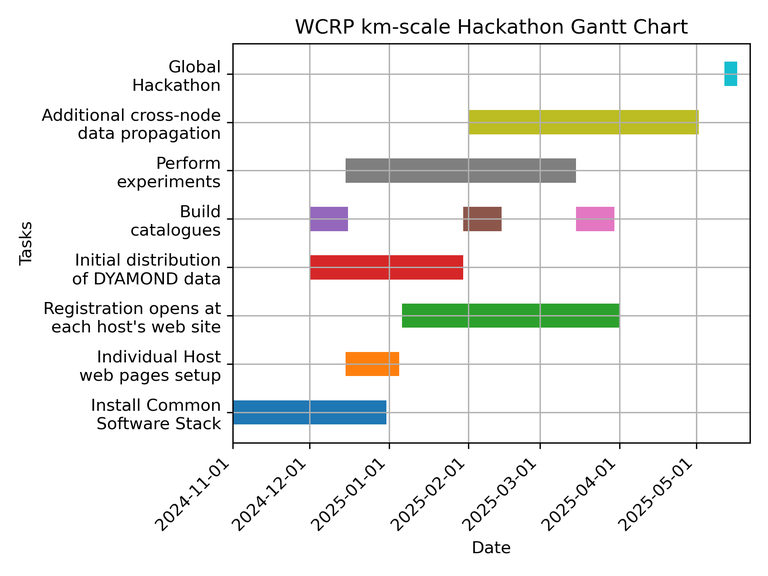| Introduction | Expected Outcomes | Organization and Timeline | Where will it take place | How to join | Program and Protocol | Info for Hosts | Contacts and Useful Links |
IntroductionThe WCRP Digital Earths Lighthouse Activity—supported by key initiatives like Destination Earth (DestinE), Next Generation Earth System Modelling (NextGEMS), WarmWorld, Earth Visualization Engines (EVE), European Eddy-Rich Earth System Models (EERIE), WCRP ESMO, and with the endorsement of the CMIP panel—is serving as the primary sponsor and coordinating body for this hackathon. The Hackathon will be based on output from 6-8 models simulating the annual cycle at sub 5 km resolution. The models adopt a common simulation protocol, namely the Sendai protocol. The goals of the event are to:
This hackathon offers a valuable opportunity for experts to collaborate, share insights, and help advance the development of earth system modeling tools and practices. Watch the introduction webinar to learn more: |
|
Follow the hackathon LinkedIn page! |
Where will it take place
|
Satellite Nodes
In addition to the regular hackathon nodes, several Affiliated Nodes will contribute to the kilometer-scale hackathon by hosting teams focused on special projects sponsored by NVIDIA, ESA, and Destination Earth. These nodes will enable targeted exploration of themes such as AI-enhanced analysis with NVIDIA, EarthCARE data utilization with ESA, and the use of DestinE datasets with ECMWF. While the analyses are not pre-defined, all projects will benefit from shared hierarchical data grids and new lightweight analysis frameworks, allowing researchers—including those bringing their own scientific questions—to rapidly prototype and collaborate.
How to join
You can find the host closest to you and get in contact with them. Here's a list of the contact points for each node:
| Nodes | Websites | Registration | Science Plans | Associated Project(s) |
|---|---|---|---|---|
| Australia | Canberra node website | Registrations closed | ARC Centre of Excellence for the Weather of the 21st Century | |
| Brazil | São Paulo node website | Registrations closed | ||
| Argentina | Coming soon | Register here | ||
| China | Beijing node website | Register here by April 15th, 2025 | ||
| Germany | Hamburg node website | Register here by April 21st, 2025 | nextGEMS, WarmWorld | |
| Japan | Tokyo node website | Registrations closed | ICCP-GSRA | |
| UK | Oxford node website |
Registrations closed
|
||
| US-Central | Boulder node website | Register here by April 23, 2025. Travel applications due March 21 | ||
| US-East | Princeton node website | Registrations closed | XSHIELD | |
| US-West | Berkeley node website |
Register here (deadlines: 23 April for foreign nationals; 5 May for US citizens) |
Program and protocol
This is the general schedule that should allow most participants to travel on Monday and Friday
-
Monday afternoon to Friday morning
-
Monday afternoon: welcome, theme updates, general information
-
Friday afternoon: work group roundup, general discussion of future steps for the project
-
Tuesday to Thursday: group work
-
General discussions and updates on daily highlights across nodes (modalities TBD)
-
Each node will decide on how to structure the week work
Here is a very general draft agenda.

